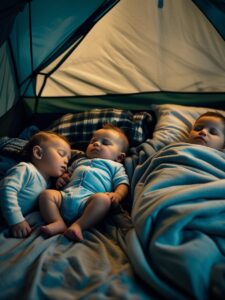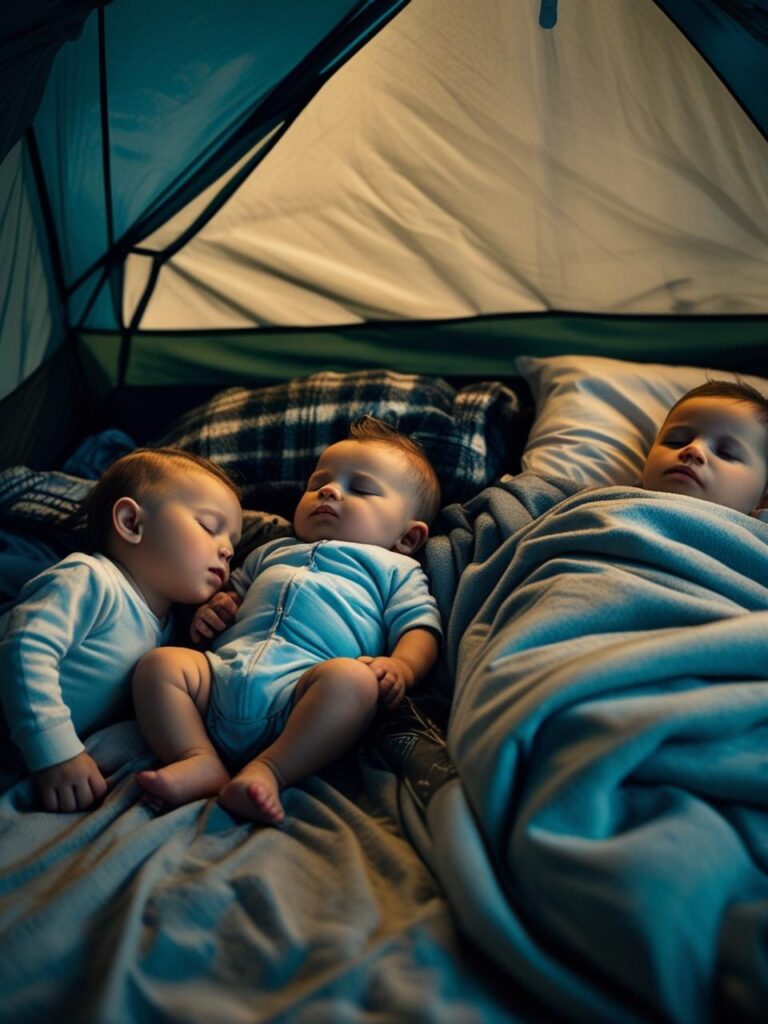They’re still sleeping—huddled together under that thin blue blanket, as if it were the warmest thing in the world. I sit there, watching them breathe in and out, pretending—just for a moment—that we’re on vacation.
Our tent is tucked behind a rest stop, just past the county line. Technically, it’s not allowed, but it’s quiet. Yesterday, the security guard looked at me like he knew… and chose not to say anything. At least not yet.
I told my boys we were camping. “Just us guys,” I smiled, trying to sound like it was all part of a plan. What they didn’t know was that three days earlier, I’d pawned my wedding ring for gas and a few jars of peanut butter.
The truth is… they’re still too young to know what’s really happening. To them, eating cereal from paper cups and sleeping on air mattresses is a fun adventure. They think I’m a hero with a plan.
But the reality is I’ve called every shelter I could from here to Roseville. None could take a dad with three kids. One said maybe Tuesday. Maybe.

It’s been six weeks since their mom left. Said she was going to her sister’s. She left a note and half a bottle of Advil on the kitchen counter. I haven’t heard a word since.
I’ve been trying to hold everything together — using gas station sinks to wash up, making up bedtime stories, sticking to our nightly routine like everything is normal.
Then last night, something happened.
Micah, my middle son, whispered in his sleep, “Daddy, I like this better than the motel.”
That nearly broke me.
Because he meant it. And because I knew this might be the last night I could keep this going.
This morning, as I started unzipping the tent, Micah stirred and rubbed his eyes. “Daddy? Can we go see the ducks again?”
He meant the ducks near the pond behind the rest stop. We’d gone the night before and his laughter had lit up the night.
I forced a smile. “Yes, buddy. After your brothers wake up.”
Once we packed our few things and brushed our teeth at the public sink, the sun was already rising. My youngest, Toby, held my hand and hummed. Caleb, the oldest, kicked rocks and asked if we’d go hiking.
I was just about to tell them we couldn’t stay here again when I saw her.
She looked about 60, walking toward us with a large thermos and a brown paper bag. Wore a flannel shirt and had a long braid down her back. I braced myself for her to tell us to move on.
But instead, she smiled.
“Morning,” she said. “You boys want some breakfast?”
The boys lit up before I could respond. Inside the bag were still-warm biscuits and eggs. The thermos held cocoa—not coffee. Cocoa. For them.
“I’m Jean,” she said, sitting on the curb beside us. “I’ve seen you out here the last couple nights.”
I nodded, unsure of what to say. I didn’t want pity. But her eyes didn’t show pity—just quiet understanding.
“Been there myself,” she added. “Not camping though. Slept in a church van with my daughter in ‘99.”
“Really?” I asked, surprised.
She nodded. “People ignored us. Acted like we didn’t exist. I promised I’d never do that to someone else.”
Something about her made me open up. I told her about the motel, their mom, the shelters that kept saying “maybe.”
She just listened. Then said, “Come with me. I know a place.”
“Is it a shelter?” I asked.
“No,” she said. “It’s better.”
We followed her old sedan down a gravel road, my hands shaking on the wheel. I kept looking back at the boys—laughing in the backseat—clueless that we might be heading toward something life-changing.
The car stopped in front of a small farm: red barn, goats in the yard, a little white house. A wooden sign read: The Second Wind Project.
Jean explained on the porch. It was a safe place for families who’d hit hard times. Run by volunteers. No endless paperwork, no red tape. Just help.
“You’ll have food, a bed, and time to get back on your feet,” she said.
I looked at her. “What’s the catch?”
“No catch,” she replied. “Just lend a hand—feed the animals, fix what you can.”
That night, we slept in a room with real walls and soft lighting. A humming fan above us. I tucked the boys in and sat on the floor and cried silently.
Over the next week, I chopped wood, patched fences, and even learned how to milk a goat. The boys made friends—twin girls staying there with their single mom. They played with chickens, picked berries, and said “thank you” after every meal.
One night, I sat with Jean on the porch.
“How did you find this place?” I asked.
She smiled. “Didn’t find it. Built it. After we got back on our feet, I decided I wanted to help others the way no one helped me. I had a little land and a big heart.”
Her words stayed with me.
Two weeks passed. Then a month. I found part-time work fixing cars at a mechanic shop. Frank, the owner, handed me a paycheck and said, “Come back Monday.”
We stayed six more weeks. I saved what I could and found a small duplex on the edge of town. The floor tilted, and the pipes rattled—but it was home.
We moved in the day before school started.
The boys never asked why we left the motel or why we “camped.” To this day, Micah says we once lived on a farm with goats and helped fix a fence.
But three months later, something happened.
One Sunday, I found an envelope on our doorstep. No name, just the words Thank you on the front.
Inside was an old photo—Jean, young, holding a baby near that same red barn. Behind it was a handwritten note:
“What you gave my mom, she gave to you. Please pay it forward when you can.”
I asked around. No one knew who left it. I tried calling Jean, but her number didn’t work anymore. When I drove back to the farm, it was empty. A sign on the gate read: Resting Now. Help Someone Else.
So I did.
I helped the elderly lady next door with groceries. Fixed a neighbor’s leaky faucet. Gave our old tent to a man who’d just lost his job.
Then one night, there was a knock on the door. A man stood there with two scared kids and said someone from the food pantry told him I might be able to help.
I didn’t even think twice. I made cocoa. Let them sleep in the living room.
That night started something new.
Frank at the shop agreed to take him on. I called a few friends. We got them clothes, a mattress, even shoes for the kids.
And slowly, our small home became someone else’s second wind.
I used to believe that hitting rock bottom was the end.
Now I know… sometimes, it’s the beginning of something better.
We weren’t camping.
But in losing everything, we found what mattered most.
And even now, every night when I tuck the boys in, I still hear Micah’s voice.
“Daddy, I like this better.”
So do I, son. So do I.
Because sometimes, the lowest place you land… is the best place to grow.


